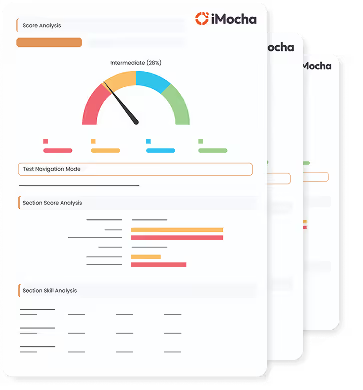


Choose easy, medium, or tricky questions from our skill libraries to assess candidates of different experience levels.
Choose easy, medium, or tricky questions from our skill libraries to assess candidates of different experience levels.

Choose easy, medium, or tricky questions from our skill libraries to assess candidates of different experience levels.

Choose easy, medium, or tricky questions from our skill libraries to assess candidates of different experience levels.
This a comprehensive PDF report, which you can instantly download and share with your hiring team or candidates for seamless collaboration.
Download Sample Report



Utilize this assessment to identify candidates' and employees’ skill gaps through assessments and make skill-first talent decisions. It enables you to assess individuals’ skills in topics like OTP, VM, debugging, and more. Additionally, this test helps you save 45% of your hiring time and measure ROI of your learning programs.





%20(1).webp)
1. What is Erlang?
It is a runtime environment and general-purpose programming language. It simplifies concurrent programming for programmers. Instead of using shared variables to exchange data, the processes use message passing, which does away with the requirement for locks. It is an effective framework for fault tolerance and error containment.
2. Why use iMocha's skills test?
All the questions of this skills test are designed by SMEs considering the Equal Employment Opportunity (EEOC) guideline to enable you to assess the capabilities of existing and potential candidates bias-free.
That is why the emphasis is placed on assessing the practical skills acquired through real work experience rather than just theoretical understanding. Moreover, this assessment also helps organizations benchmark their workforce against industry standards.

The skills assessment test helps to screen candidates who possess the following abilities:
The test reporting capabilities of this test will allow you to get a complete overview of their test performance and skills. Also, to safeguard the integrity of individuals and the accuracy of the results during their assessment, you can employ numerous anti-cheating measures provided along with this assessment.







.webp)
.webp)
.webp)
.webp)



